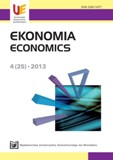Regulacja – wartości – ramy instytucjonalne
Regulation – values – institutional framework
Author(s): Bożena BorkowskaSubject(s): Economy
Published by: Wydawnictwo Uniwersytetu Ekonomicznego we Wrocławiu
Keywords: regulation; economic regulation; social regulation; values; institutions
Summary/Abstract: On the basis of political economy many authors formulate the claim that the wide and growing range of state regulation is characteristic for the contemporary market economy. This raises the question about the reasons for the development of a “regulatory state”. The answers, formulated in the literature, are that economic and social values are important in the formation of the state regulation being for and against it. However, the question arises what determines which values will be considered as a priority, and consequently will determine the implementation of a certain regulation .The purpose of this article is a reflection on the relationships between regulation, economic and social values and institutional framework, in particular the constitution. The first part of the paper discusses two approaches to regulation: positive and normative. The positive conceptions of regulation assume that regulation is a commodity, and its scope is influenced by the demand for regulation notified by interest groups and the supply offered by politicians. However, the question of how to shape the equilibrium in a “market of regulation”, the positive theory of regulation formulates different responses indicating both the possibility of capturing the regulation by narrow interest groups and the formation of equilibrium that benefits consumers and minimize dead-weight welfare loss. This ambiguity of prediction in a positive theory of regulation causes that normative concepts are gaining importance .In these concepts, it is assumed that the market fails, not only in achieving an efficient allocation of social resources but also in the implementation of other, non-economic, social objectives. This leads to the distinction between economic regulation and social regulation and raises the question of the possibility of implementation by regulation such different values as economic efficiency, equality and justice. This issue is explored in the next section, which discusses the concept of the relationship between economic and social regulation in the context of the values proposed by E. Windholz and G. Hodge. According to the authors, this relationship can be formed in two ways: 1) social adjustment may be an element of economic regulation and then the economic values such as efficiency, competition, innovation will have superior nature; 2) by means of regulations socially desirable goals are accomplished and then justice, equality, social solidarity are first-class values, but economic values become secondary. The article casts doubt that in the regulation process we are dealing only with the hierarchy of values in which either economic or social values are superior. At the same time the author points to the possibility of the formation of the relationship between economic and social regulation in a way treating certain economic and social values equally. This issue is discussed in the next section of the paper, in which there is formulated and justified a hypothesis t
Journal: Ekonomia
- Issue Year: 2013
- Issue No: 25
- Page Range: 197-209
- Page Count: 13
- Language: Polish

